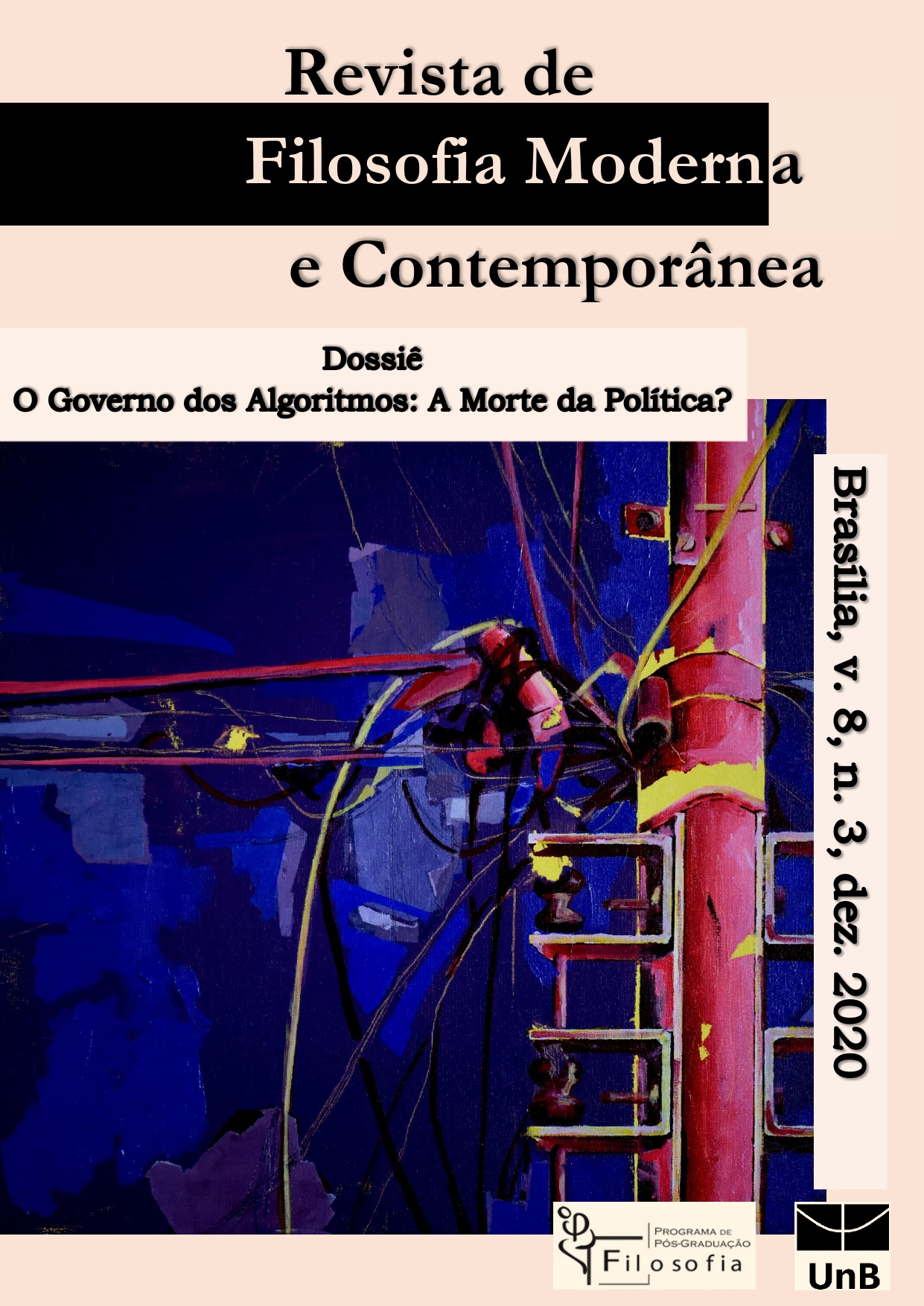Nietzsche
From the Technique of Memory to the Technique of Forgetting?
DOI:
https://doi.org/10.26512/rfmc.v8i3.31233Keywords:
Nietzsche. Technique. Memory. Forgetfulness. CultureAbstract
The various memory techniques have privileged the constitution of an institutional apparatus. The Nietzschean project of overvaluing values ”‹”‹imposed itself against these dispositions of memory, therefore, it operates in an inverse movement, by promoting techniques that privilege the dissolution of memory in forgetfullness. In order to weaken the institutional moral apparatus and strengthen the project of values ”‹”‹that privilege life and its soul dispositions. However, in this Nietzschean project there is an aporia: that of remaining in the sphere of the affirmation of the technique. If, on the one hand, Nietzsche questions all technical mechanisms, namely those related to educational establishments on the other, he does not go beyond this sphere, says the technique through the mechanisms of forgetfulness, when questioning the techniques of memory. To what extent do Nietzsche's writings inspire fruitful reflection to think about technique and its application to memory?
Downloads
References
ASSMANN, Jan. Cultural Memory: Script, Recollection, and Political Identity in Early Civilizations. In: Historiography East & West, University of Heidelberg: Leiden, 2003, pp. 154-177.
CÃCERO, De Oratore.
CLARK, Maudemarie. Nietzsche’s imoralism and the concept of morality. In: Nietzsche, Genealogy, Morality. Essays On Nietzsche’s genealogy of morals. Edited by Richard Schacht. University of California Press: Berkeley, 1994, pp. 14-34.
COPLESTON, Federick. A history of philosophy. Vol VII. Modern Philosophy: From the Post-Kantian Idealists to Marx, Kierkegaard, and Nietzsche. Image Books Doubleday: New York, 1963.
COWAN, Michael. Nichts ist so sehr zeitgemäss als Willensschwäche. Nietzsche and the Psychology of the Will. In: NIETZSCHE-STUDIEN Internationales Jahrbuch für die Nietzsche-Forschung, Band 34, Walter de Gruyter, Berlin, 2005, pp. 48-74.
FINK. Eugen. Nietzsche’s philosophy. Translated by Goetz Richter. Athlone Contemporary European Thinkers. Continuum: London, 2003.
FRAGOSO, Myriam Xavier. Nietzsche e a Educação. In: Transformação, Marília, n. 01, 1974, pp. 277-293.
GIACÓIA, Oswaldo Jr. O último homem e a técnica moderna. In: Natureza Humana, v. 01, n. 01, São Paulo, jun. 1999.
HAASE, Ullrich Michael. Nietzsche’s critique of technology: a defence of phenomenology against modern machinery. In: Nietzsche, epistemology and philosophy of science. Nietzsche and science II, Edited by Babette Babich and Robert S. Cohen, Boston Studies in the Philosophy of Science, vol 204, Springer science + Business Media, BV, Boston, 1999.
KELLEY, Matthew. The Body of Ideas: Nietzsche, Embodiment, and the Genealogical Method. In: Georgia State University ScholarWorks @ Georgia State University. Georgia, Philosophy Theses, Department of Philosophy, 2019.
MULHALL, Stephen. The promising animal. In: Nietzsche’s on the genealogy of morality. A critical guide. Edited by Simon May. Cambridge University Press: Cambridge, 2011, pp. 234-264.
NIETZSCHE, F. W. Kritische Studienausgabe. Herausgegeben von Giorgio Colli und Mazzino Montinari. Verlag de Gruyter: Berlin, 1999. 15 Bd.
_____. Nachgelassene fragmente. Herausgegeben von Giorgio Colli und Mazzino Montinari. Walter de Gruyter: Berlin, 1999. 15 Bd.
_____. Briefwechsel: Kritische Gesamtausgabe Briefwechsel KGB. Herausgegeben von Georgio Colli und Mazzino Montinari. Walter de Gruyter: Berlin, 1981. Bd III1 und 1975. Bd I2.
_____. Além do bem e do mal. Prelúdio a uma filosofia do futuro. Trad. Paulo César de Souza. São Paulo: Companhia das Letras, 2000.
_____. Genealogia da Moral. Uma polêmica. Trad. Paulo César de Souza. São Paulo: Companhia das Letras, 2001.
_____. Escritos sobre Educação. Trad. Noéli Correia de Melo Sobrinho. São Paulo: Edições Loyola, 2003.
_____. Escritos sobre história. Trad. Noéli Correia de Melo Sobrinho. São Paulo: Edições Loyola, 2005.
OLIVEIRA, Jelson Robrto de. Nietzsche e o transhumanismo: e, torna da questão da autossuperação do homem. In: Kriterion, Belo Horizonte, n. 135, Dez./2016, p. 719-739.
RAMADOVIC, Petar. From Haunting to Trauma: Nietzsche's Active Forgetting and Blanchot's Writing of the Disaster. University of New Hampshire, 2001.
SCHACHAT, Richardt. Nietzsche: Human, All Too Human. In: Introductions to Nietzsche. Ed. by Robert Pippin. Cambridge: Cambridge University Press, 2012. pp. 91-111.
TURNER, Zeynep Talay. Nietzsche on memory and active forgetting. In: The European legacy. Toward new paradigms, International Society for the study of European Ideas, 2019, VOL. 24, NO. 1, 46”“58.
YATES, F. A. A arte da memória. Campinas: Editora da Unicamp, 2013.
Downloads
Published
How to Cite
Issue
Section
License
Copyright (c) 2021 Journal of Modern and Contemporary Philosophy

This work is licensed under a Creative Commons Attribution-NonCommercial-NoDerivatives 4.0 International License.
Copyright for articles published in this journal is retained by the authors, with first publication rights granted to the journal. By virtue of their appearance in this open access journal, articles are free to use, with proper attribution, in educational and other non-commercial settings.


